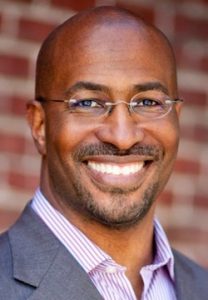With First Step Act Set for Senate Vote, Prison Fellowship and Other Backers Weigh In
From Michelle Malkin to the NFL, from Mike Huckabee to the New York Times, a diverse group stands behind prison reform. Advocates reveal why they're driven to see it enacted this year.
On Tuesday, Majority Leader Mitch McConnell announced that a Senate vote on the First Step Act will take place before the year ends. Rarely has such a broad coalition united this year, with supporters stating the prison reform bill may get 75 votes next week.
Backers include Senators Tim Scott, R-S.C., Cory Booker, D-N.J., Rand Paul, R-Ky., and Amy Klobuchar, D-Minn. This week, past critics such as Senator Ted Cruz, R-Texas, shifted to support after changes to the bill.
Prison Fellowship, the leading evangelical group involved in criminal justice, has played a key role in bringing diverse voices together. Their vice president of government affairs Heather Rice-Minus cautions that the battle is not over yet.
“The sponsors of the bill and the White House have been working very hard to get this done,” she says in an interview. “I am hitting the Hill every day talking to Senate offices, particularly Republicans. Where there’s a will, there’s a way.” After nearly a year backing the criminal justice effort, President Trump reiterated his support in a November 14 press conference.
Leaders on the left have also endorsed it, notably Dream Corps chairman Van Jones. “We’ve got it backwards in our thinking sometimes, that the only way to get the crime rate down is to put more people in prison,” says Jones in an interview. “In some cases, it’s actually the reverse.”
Broad Support on Right and Left
The First Step Act comes after years of relationship-building between uncommon allies. Coalition groups Right on Crime, Justice Declaration and #cut50 contend that common approaches to nonviolent criminals do not work. They reject rhetoric such as Lock them up and throw away the key as dehumanizing.
“That mentality is not particularly effective at reducing crime,” says Dan Darling, vice president at the Ethics and Religious Liberty Commission of the Southern Baptist Convention. “People go in there and become professional criminals. Then when they get out, there are really no pathways for them into a productive life.”

Van Jones
His perspective is echoed by Van Jones, a former Obama administration official. “These prisons can be universities for crime,” says Jones. “We want to make them universities for jobs. Republican governors like Rick Perry and Governor Deal in Georgia show this can be done. Their states have been able to bring down the incarceration rate and crime rate at the same time.”
However, two Republican Senators Tom Cotton of Arizona and John Kennedy of Louisiana maintain the bill is not “tough on crime.” They have stated their intent to derail the First Step Act in the few days left before Congress adjourns. With political winds shifting in the new Congress come January, the bill’s fate would be uncertain.
Members of the White House Faith Leaders Initiative contend the effort represents a just, balanced response. “You can sit back and criticize, or you can come to the table,” says Pastor Jentezen Franklin, a charismatic minister who leads a Georgia congregation of 11,000 people.
“These prisons can be universities for crime. We want to make them universities for jobs. Republican governors like Rick Perry… show this can be done.” – Van Jones
“When asked why he was meeting with the president, Dr. Martin Luther King said, Presence is everything,” he continues. “I would be at the table if Hillary were president, if I were asked. If you’re not at the table, you don’t have any influence.”
Humane Approach to “Tough on Crime”
Every year, American taxpayers spend $7 billion to lock up approx. 180,000 federal offenders. One of few public policy groups viewed as nonpartisan on Capitol Hill, Prison Fellowship has spent countless hours educating policymakers on the prison system.

Heather Rice-Minus
“Right now, the way the government functions is we sentence people and send them to prison,” says Heather Rice-Minus. “We warehouse them. But there are not currently enough programs to serve them.” The Federal Bureau of Prisons reported this year that over 16,000 inmates are on a waitlist for literacy programs.
Author of The Dignity Revolution, Dan Darling admits it’s a struggle to see both sides of criminal justice. “We have to see the dignity of victims of crime and the incarcerated population,” he says. “Crimes should be discouraged and punished. Yet those who are guilty are made in the image of God too. Part of upholding their dignity is seeing them as full people, not as a ‘throwaway.’ They are not just the sum total of their actions.”
The First Step Act addresses this by providing inmates incentives to undergo substance abuse counseling and job training before reentering society. It also funds a study to determine which community programs best reduce recidivism. Currently, 68 percent of those sent to prisons are rearrested after three years.
“This is going to be our Christmas miracle. We’re going to see an overwhelming amount of support.” – Heather Rice-Minus
“No one wants people who will make new victims or commit new crimes,” says Rice-Minus. “What is more tough on crime than actually making people earn back the public’s trust and make amends for what they’ve done while in prison?
“We want people participating in programs, transforming their lives, and coming back home as productive citizens.”
What Changed in Latest Version
Wednesday, the Senate Judiciary Committee released revised text of the bill. Rice-Minus provides background details to explain the changes in layman’s terms.
“Currently, there are only two ways for a federal defendant to get out from under a charge with a mandatory minimum,” she says. “One is to provide substantial assistance to the government, like if they have intel. A lot of times, though, someone with a lower-level drug offense does not have that. That’s where the ‘safety valve’ comes in.”
She points to the example of Alice Marie Johnson, whom Kim Kardashian West successfully lobbied to receive a presidential pardon. “This grandmother was sentenced to decades in prison for a nonviolent drug crime,” says Rice-Minus. “This ‘safety valve’ reform allows judges to have more flexibility. We are trying to make sure that sentences are proportional, that they fit the crime.”
Adding to the impetus for reform, Darling notes that certain criminal sentences have not been handed down on a fair basis. “Particularly as you talk about minority populations, the punishment is often disproportionate,” he says. “If you have this one-size-fits-all sentencing model, it ties the hands of judges to make wise decisions.”
“The new language expands eligibility for that ‘safety valve’ just a little bit,” clarified Rice-Minus. “Sometimes the criminal history factor can really hang some people up. But having more people eligible to be considered doesn’t mean they’ll automatically get it. A judge will look at several factors.”
“Christmas Miracle”
Expectations are high for the Senate vote next week, to be followed by a House vote. “I believe this is going to be our Christmas miracle,” says Heather Rice-Minus of Prison Fellowship. “We’re going to see an overwhelming amount of support.”
Van Jones urges policymakers to get this bipartisan effort over the finish line. “I think it’s smart for conservatives to take yes for an answer,” he says. “Let’s bring these conservative victories at the state level up to Washington, D.C. That’s really what we’re trying to do.”
While Jones has received criticism from his side for backing the First Step Act, President Trump has as well from the far right. Reporting in some media outlets has called the bill a “jailbreak,” among other critiques. Faith leaders who have served as advisors to the White House see the issues in a different light.
“President Trump has received a lot of blowback on this, but I think his heart is to lean toward helping people,” says Pastor Jentezen Franklin. “These people have done their time and done all they can to rebuild their lives. Everybody needs another chance, you know?”
“I’m excited because I see it as a generational curse that’s being broken off of entire families, by the tens of thousands.”
Watch for updates next week on the First Step Act. Explore The Stream’s coverage of criminal justice reform, and add your name to the Justice Declaration, a coalition convened by Prison Fellowship.







